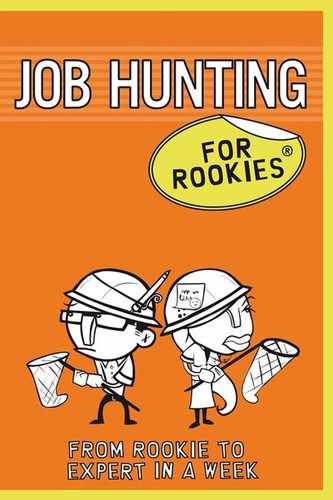CHAPTER 7
Impressing interviewers
with your competence
and capability
Talking about essential interview themes
Interviewers can ask many questions, but thankfully you don’t have to memorize answers to every single question. All you need to do is prepare to answer questions covering the following four themes:
1. Questions about your capability – in other words, “What can you do for us?” Interviewers are probably most focused on how you can use your skills and knowledge to help them achieve organizational goals.
2. Questions about chemistry – in other words, “Will we like you and get along with you?” Employers don’t just want to hire talented people; they also want to hire friendly people with similar values to the rest of the team.
3. Questions about your commitment – in other words, “Why do you want to work for this organization?” Employers prefer to hire people who want to work for their particular organization rather than people who would be content with just a job.
4. Questions about cash – in other words, “How much will it cost us to hire you?” In many situations, the pay package may not be up for negotiation; however, in some cases an employer may be willing to pay more in order to hire exceptional candidates.
Let’s cover how to respond to questions about these four categories of questions in the rest of this chapter and in Chapter 8.
Understanding the golden rules when talking about your capability
Most of an interviewer’s questions will focus on your capability – that is, your ability to do the job and deliver results. If you follow these six rules, you will go a long way to making a strong impression.
Rule 1: Explain problems solved and results achieved
Interviewers are not terribly interested in hiring people who have worked hard or merely kept busy in their previous jobs. So spending lots of time telling an interviewer about your day-to-day work or responsibilities will have little impact on them.
Interviewers want to hire people who can solve problems and deliver results for them. So be sure to spend most of your time sharing stories about problems you have solved and results you have delivered for your current or previous employers.
 Rookie Buster
Rookie Buster
Interviewers want to hire people who can solve problems and deliver results for them.
Rule 2: Provide evidence for your assertions
Many interviewers are trained to listen for evidence of how you have put your skills into use. Avoid giving only personal opinions about yourself and instead tell interviewers the evidence that you have for your beliefs. Whenever possible, use any positive feedback or comments (whether verbal or written) that you received to back up your claims.
Compare the following examples:
Assertion without evidence = unimpressive
• “I believe the customer was happy with her purchase.”
• “I am an exceptional sales person.”
Assertion with evidence = impressive
• “The customer told me how happy she was with her purchase.”
• “In my last evaluation, my boss wrote a comment saying that I was one of the strongest sales people she had ever had in her team.”
If you have actual examples or evidence that you can bring along, then use that as well. Bring along a portfolio of your work, including:
• Samples of your work, such as drawings, diagrams, items of clothing you have made, photographs you have taken, or whatever might be appropriate for your field of work.
• Proofs of performance including awards, testimonials, positive evaluations or appraisals, letters of commendation, and so on.
 Rookie Buster
Rookie Buster
Avoid giving only personal opinions about yourself and instead tell interviewers the evidence that you have for your beliefs.
Never present items from your portfolio without permission. But do mention them if appropriate to strengthen your case. For example, rather than simply saying “In my last evaluation, my boss wrote a comment saying that I was one of the strongest sales people she had ever had in her team,” you could say: “In my last evaluation, my boss wrote a comment saying that I was one of the strongest sales people she had ever had in her team. I’ve got a copy of the evaluation here if you’d like to see it.”
Rule 3: KISS your answers
Interviewers hate candidates who drone on and on. So “Keep It Short and Sweet” (KISS). Whenever you answer a question, aim to keep your response to less than two minutes. If you haven’t finished your story within that time, at least check that what you’re saying is useful by asking the interviewer a question such as:
• “Is this the kind of response you were looking for?”
• “Shall I go on?”
By asking such a question, you give interviewers the opportunity to steer you in the right direction or ask you an entirely different question if what you’re saying is not what they were looking for.
 Rookie Buster
Rookie Buster
Whenever you answer a question, aim to keep your response to less than two minutes.
Rule 4: Answer the question that was actually asked
One of the dangers of memorizing answers to questions in advance is that some candidates end up regurgitating a response regardless of the question that was actually asked! So make sure you listen carefully to the question and answer it – rather than answering the question you would like to answer.
If you are in any way uncertain about the question – for example if an interviewer uses terminology you aren’t familiar with or if the interviewer asks a lengthy question with many parts to it – do ask the interviewer to rephrase the question:
• “Sorry – I didn’t catch all of that, could you repeat that last bit for me again, please?”
• “I’d love to answer the question, but I’m not familiar with the term ‘TQM’. Could you explain what you mean by that, please?”
Rule 5: Meet the employer’s needs – not yours
Some candidates fall into the trap of going into an interview and talking about what they want. They ask questions like “How much do you pay?” or “How much time off will I get?” Unfortunately, interviewers hate candidates who seem to be most interested in what they can expect from the employer.
Interviewers want to hire candidates who are more interested in how they can help the employer to meet its goals. Remember at all times that your attitude must be “How can I help this organization to succeed?” rather than “What can I get out of this organization?”
 Rookie Buster
Rookie Buster
Remember at all times that your attitude must be “How can I help this organization to succeed?” rather than “What can I get out of this organization?”
Rule 6: Match your manner to the topics you discuss
I have already mentioned in Chapter 6 that how you speak can make as much of an impact as what you say. Candidates who relay facts and stories in a calm and emotionless manner don’t always win over interviewers. The most successful candidates are those who can relay facts and stories in a positive, enthusiastic way.

Think of yourself as an actor – albeit on a chair instead of a stage, and playing to a very small audience of only a few interviewers. Actors who recite their lines without emotion are dull and don’t seem believable. Great actors always use their feelings to grab the attention of their audience. And that’s what you need to do too.
So make sure you appear pleased and happy when talking about your past achievements. Get across your enthusiasm when answering questions about why you want to work for this organization. Speak in a more sober fashion if you need to talk about unfortunate circumstances or difficult times.
 Rookie Buster
Rookie Buster
The most successful candidates are those who can relay facts and stories in a positive, enthusiastic way.
Constructing answers to questions about your capability
I’ve mentioned several times (in previous chapters as well as in this one) that employers are most interested in candidates who can demonstrate how they have used their skills to deliver results on behalf of their employers.
Showing the interviewers your CAR
To create success stories with which to impress interviewers about how you have delivered such results, you should use the acronym CAR:
• C – Challenge – what was the situation? Aim to explain in just a couple of sentences the problem or issue that you had to tackle. Bear in mind that you should spend as little time as possible talking about the background so that you can focus on the next part, the actions.
• A – Actions – what specific actions did you take in order to deal with the problem or situation? Interviewers are most interested in the actions you took – so spend most of your time talking through your actions.
• R – Result(s) – what was the outcome (hopefully a positive one) that you got as a consequence of your actions? And, if you had to do it again, what did you learn from the results you attained?

Using a worksheet to capture your success stories
Use the worksheet on the next page to prepare success stories to tell interviewers. Work through the five questions to arm yourself so that you can give interviewers as much (or as little) information and detail as they need. For example, some interviewers may not ask questions 2 (“Who else was involved or affected?”) or 5 (“What did you learn?”). However, working through the worksheet in a methodical way will help you to prepare for just about any interview situation.
Challenge
Q1. What was the situation?
Q2. Who else was involved or affected?
Actions
Q3. What steps or decisions did you take?
Step 1:
Step 2:
Step 3:
Step 4:
Etc. (continue to write other actions on a blank sheet if necessary)
Results
Q4. What was the eventual outcome? (Ideally, quantify with numbers)
Q5. What did you learn?
Have a look back at the section “Matching what you have with what the employer wants” (on page 46). Look again at the list of skills and knowledge that the employer needs. And then complete the worksheet twice for every skill. You need to have two stories for every skill that the employer wants. Either photocopy the worksheet or simply write out the answers to the questions on blank sheets of paper.
 Rookie Buster
Rookie Buster
You need to have two stories for every skill that the employer wants.
Example: completed worksheet
There’s an example of a completed worksheet on page 126. The candidate has identified that the organization needs someone with planning and organization skills.
Once you have completed the worksheet to cover all of the skills that the employer needs for this role, you can use it in response to many questions. The completed worksheet could be used to answer a range of questions including:
• “Tell me about a project that you’re proud of.”
• “What are your major achievements?”
• “We need people who are good at planning and organizing – do you have much experience of that?”
Please do take the time to complete your own worksheet. Once you have completed it twice for every skill that the employer needs for this role, you can be sure that you will be able to answer just about any question about your capability that an interviewer could throw at you.
Q1. What was the situation? My boss (Diana) asked me to plan the annual summer party. She gave me a budget of £4,000 for the entire department, which was 10 per cent less than what her previous assistant had to organize the previous year’s party.
Q2. Who else was involved or affected? 120 staff in our department; suppliers such as hotel venues and caterers.
Actions
Q3. What steps or decisions did you take?
Step 1: When Diana asked me to plan the party, I sent out an email to the entire department asking what they liked and didn’t like about last year’s party.
Step 2: I reviewed the comments and discovered that people said the food hadn’t been very good and that the venue didn’t have enough car parking.
Step 3: I contacted 8 venues to decide on the right location (one with enough parking). Also contacted 6 caterers to discuss menus within my budget.
Step 4: I wrote a business case laying out the options and presented them to Diana; she agreed that my favoured venue and caterer were also ones she liked.
Etc. (continue to write other actions on a blank sheet if necessary)
Results
Q4. What was the eventual outcome? (Ideally, quantify with numbers) Party was a great success – we had 107 people turn up (compared with only 90-something the previous year). And great comments in person and by email from satisfied colleagues.
Q5. What did you learn? You can get a good deal with suppliers if you negotiate well with them and play them off against each other. Also the importance of getting feedback from stakeholders (i.e. colleagues in department).
Coach’s notes 
• Remember to tell interviewers about problems you have solved and results you have achieved rather than merely your day-to-day duties and responsibilities.
• Quantify your interview answers whenever possible and aim to speak for no more than two minutes at a time if you can.
• Rather than memorize answers to 101 questions, prepare instead to answer questions on just four topics: your capability (“What can you do for us?”), the interpersonal chemistry (“Will we like you and get along with you?”), your commitment (“Why do you want to work for this organization?”) and cash (“How much will it cost us to hire you?”). I cover chemistry, commitment and cash in the next chapter.
• In answering questions to showcase your skills and achievements, use the CAR acronym to explain the Challenge, Actions you took, and Results you attained.
• Complete the interview story worksheet twice for every skill that the employer requires for success in the role.
Go for it! Stand out from the crowd by doing some interview prep. Focus on just four basic topics and you can be certain you’ll make a great impact during an interview. Simply consider the skills that the employer needs and then list all of the occasions in which you have put those skills into action. That’s all you need to do. Go on, do it now!

Notes |

